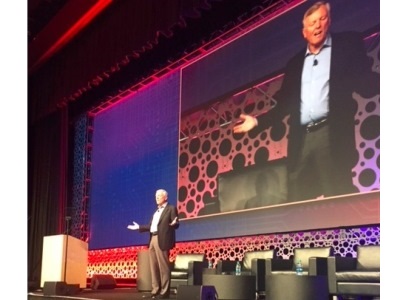Cable-Tec Expo: Rutledge Praises Cable Platform, Warns Against Poor Service
The smarter way to stay on top of the multichannel video marketplace. Sign up below.
You are now subscribed
Your newsletter sign-up was successful

DENVER – Charter Communications CEO Tom Rutledge preached to the cable engineering choir about the cable network’s “superior infrastructure” and future “6G” wireless products while pointing out how the industry has suffered because of poor service.
In a keynote speech to the Cable-Tec Expo here Wednesday, Rutledge – who was chided in a leaflet handed out near the convention center, tied to Charter’s strike situation in New York – also called password sharing a “significant issue” affecting the video business.
In a speech given from notes, Rutledge cited various companies he’d worked for in cable dating back to 1972, lastly Charter, which he noted was not long out of bankruptcy reorganization when he joined it six years ago. Today it’s the second-biggest U.S. cable operator, with a $350 stock and $90 billion market cap.
“We have been building connectivity and capacity for decades and we will be for decades to come,” he said.
Read More: Complete coverage of Cable-Tec Expo 2017
Wireless – already a big part of Charter’s business, via WiFi, with mobile services on the way next year – is poised for big growth inside the home, using techniques such as 802.11ax, he said. “We’ll be able to go from eight simultaneous streams of wireless to 64 and manage the quality throughout the home.”
He talked about the potential to combine licensed and unlicensed spectrum to get 10-gigabit per second broadband speeds in the home and enhanced WiFi. “I call it 6G inside wireless speeds,” he said. “Why 6G? Just because it’s something we have and the phone guys don’t and I want to have it.”
The smarter way to stay on top of the multichannel video marketplace. Sign up below.
He described a pathway being developed with CableLabs to use coherent fiber and two-way DOCSIS to help enable future data-heavy consumer applications that haven’t been invented yet, such as creating holograms in a personal-space environment.
As for the overhang of poor service by cable companies, he called it “an issue that has affected the industry.”
“Service is a business,” he said. “Service itself is a product, and it’s also an attribute of how we’re perceived from a regulatory perspective. Which has dramatic impacts on the way our business grows and attracts capital.”
Security was another term he stressed, both in terms of protecting customers’ privacy and in terms of over-the-top providers protecting against over-use of sharing online accounts.
“It’s a significant issue and it’s not well appreciated by the people who are new to distribution,” Rutledge said. “And everybody with an app, including the programmers that we pay, are in the distribution business now, whether they know it or not.”
He said “they have an obligation to protect their product and they don’t do a very good job and that’s affecting the business.”
Rutledge said he was confident those issues would get resolved over time. Charter will integrate more apps and popular OTT services like Netflix and Hulu and make it easier for customers to find what they want. New bundles will emerge to break up “the big fat video package.”
Charter is going to continue to build its network, he said, using all-fiber infrastructure “on the increment” toward new homes.
“We have a great future doing what we’ve always been doing in a much more sophisticated way,” he concluded. “We have an industry built to grow and last.”
Rutledge led off by saluting Charter employees recognized during the conference: Debi Picciolo received the Women in Technology award; Tom Adams, Cynthia Carpenter and Charlotte Field were inducted into the Cable TV Pioneers.
But Charter’s labor problems in New York City – where 1,800 members of Local 3 of IBEW have been on strike since March 28 and getting increasingly vocal in agitating against Charter – also were present here as union workers handed out a flyer to people walking into the Colorado Convention Center.
It cited Rutledge earning $98 million in 2016 (reported at the time to include $78 million in performance-related stock options) and said that salary “should buy better customer service.”
Kent has been a journalist, writer and editor at Multichannel News since 1994 and with Broadcasting+Cable since 2010. He is a good point of contact for anything editorial at the publications and for Nexttv.com. Before joining Multichannel News he had been a newspaper reporter with publications including The Washington Times, The Poughkeepsie (N.Y.) Journal and North County News.

